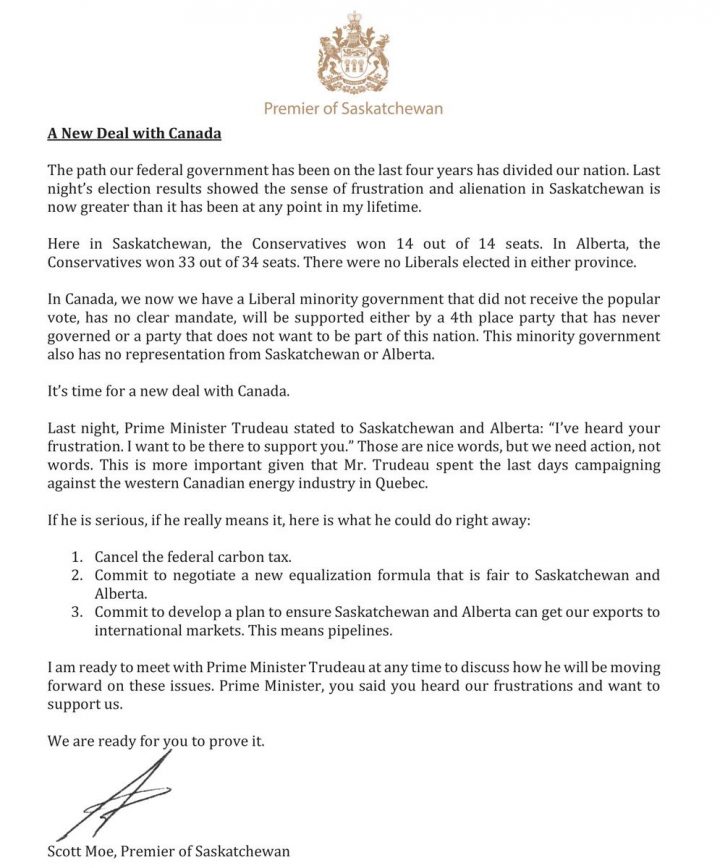Following Monday night’s election where Conservatives took a stranglehold in the western provinces, Saskatchewan Premier Scott Moe is looking for immediate action from Prime Minister Justin Trudeau.

Moe sent a letter to Trudeau, outlining his vision of a “new deal.”
In it, Moe calls for the scrapping of the carbon tax, renegotiating equalization and building pipelines so Saskatchewan can get their resources to market.
“There is frustration here in the Prairie provinces. There is a fire burning in the Prairie provinces,” Moe said.
”What I am doing is handing the prime minister this letter, this opportunity is handing him a fire extinguisher, and I’m asking him not to show up with a gas can.”
Conservatives won 14 of 14 seats in the province while winning 33 of 34 seats in Alberta. Moe said the results show that Saskatchewan’s “sense of frustration and alienation” is at an all-time high.
This sense of alienation is giving rise to a discussion around western separation. Moe called these discussions problematic, and symptomatic of an east-west divide in Canada.
“In no way is my tone divisive. Everything I’ve said is reactive to federal policies that have been put forward over the course of the last four years, and we need to change our course in this nation,” Moe said.

Get daily National news
In Monday night’s speech, Trudeau said to both provinces, “I’ve heard your frustration. I want to be there to support you.”
The two provinces did not elect any Liberal MPs. Two cabinet ministers were voted out, Ralph Goodale in Regina and Amarjeet Sohi in Edmonton.
Moe said those are “nice words,” but said if Trudeau is serious about listening to Saskatchewan and Alberta he will accept his new deal proposal.
In provincial opposition leader Ryan Meili’s view, Moe’s demand for a “new deal” lacks leadership and stokes separatism.
“Yes, address the problems that we face in the province, but do so in a way that unites us, that brings us together. Not pointing fingers elsewhere, not trying to distract and divide and really move on for having to answer for his own record,” Meili said.
In addition to resource challenges, like the transition away from coal power, Meili pointed to issues like crowded classrooms and long ER wait times.
“What we saw today was not leadership to solve those challenges. What we saw instead was a premier who is willing to stoke divisions and stoke even sentiments of western separatism,” Meili added.
When asked what compromises he would be willing to make, Moe wouldn’t budge. He said Saskatchewan is open to working with other provinces, but needs to be heard.
This feeling does not exist among Moe alone, as talk of western separatism in response to Trudeau’s victory spread among attendees at Conservative headquarters in Regina on election night.
“I am a frustrated federalist. I believe in the nation of Canada, but most certainly the policies that have taken place and the direction we have taken over the course of the last four years, I think speaks to many in this province,” Moe said.
“We saw the results of the election last night. This is not working as we move forward. We need a change of course, that’s what I’m asking for here today.”
The premier added he does not think his remarks are helping stoke western separation sentiment.
Moe said he is willing to meet with Trudeau at any time to discuss the issues at hand and his recommendations.
The premier refused to speculate on what may happen if Trudeau does not bend to Saskatchewan’s demands.










Comments
Want to discuss? Please read our Commenting Policy first.